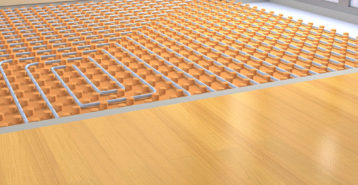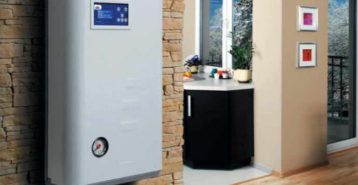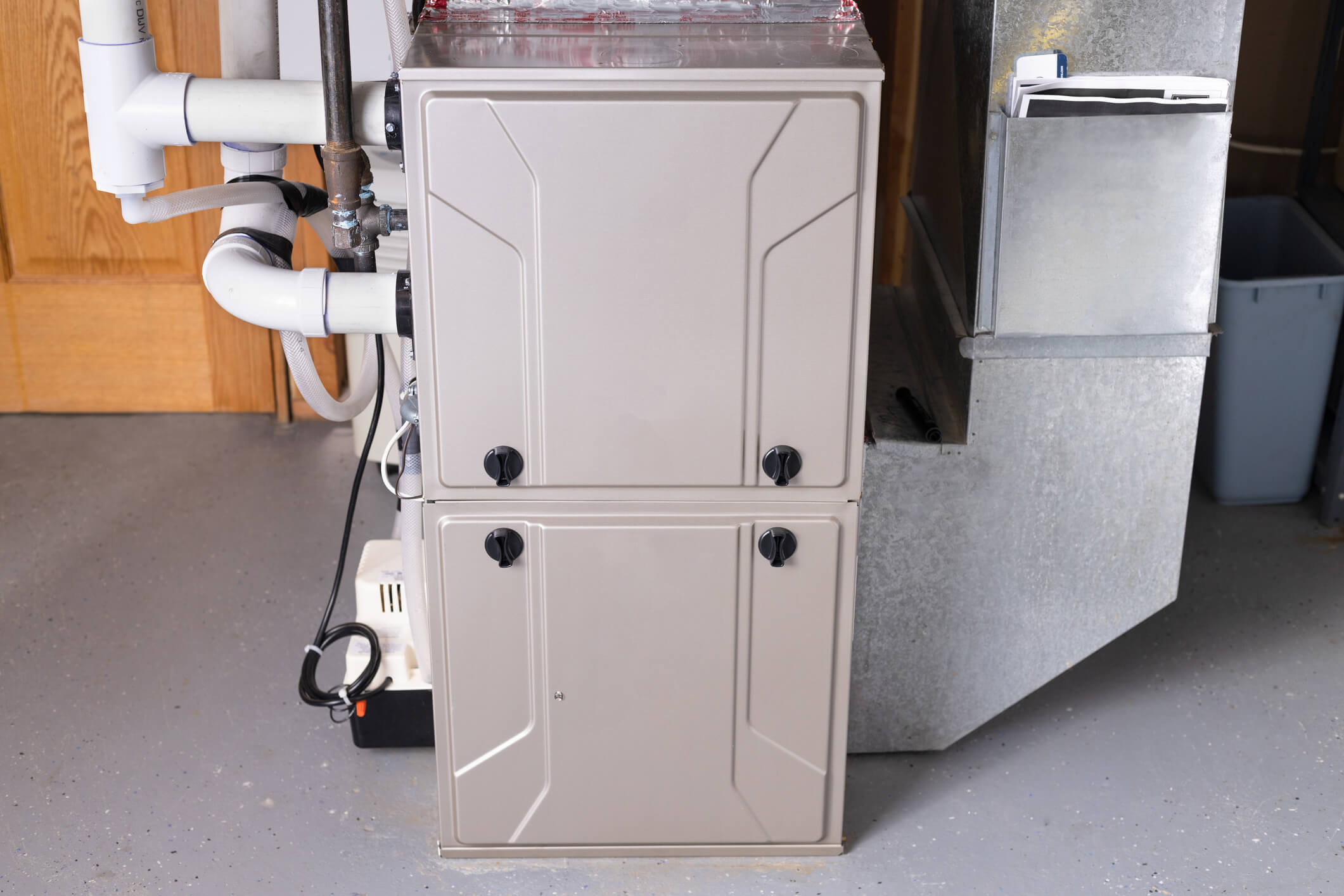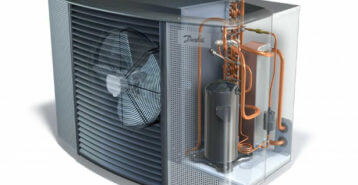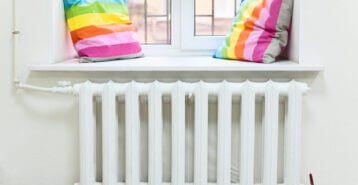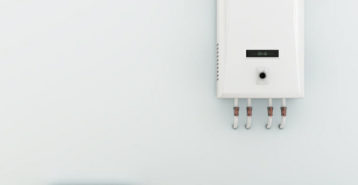What Is Central Heat?
Central heat is a whole-home heating system that distributes warm air or hot water to every room. Unlike space heaters, central systems use a main unit (such as a furnace or heat pump) and move heat through ducts and vents or through radiators. A licensed HVAC contractor can help you choose the right approach for your home, climate, and budget.
Central Heating System Types
Typically, we break central heating into furnaces and heat pumps. However, we’ll also briefly discuss radiators as some homeowners, especially those living in older homes, still use them.
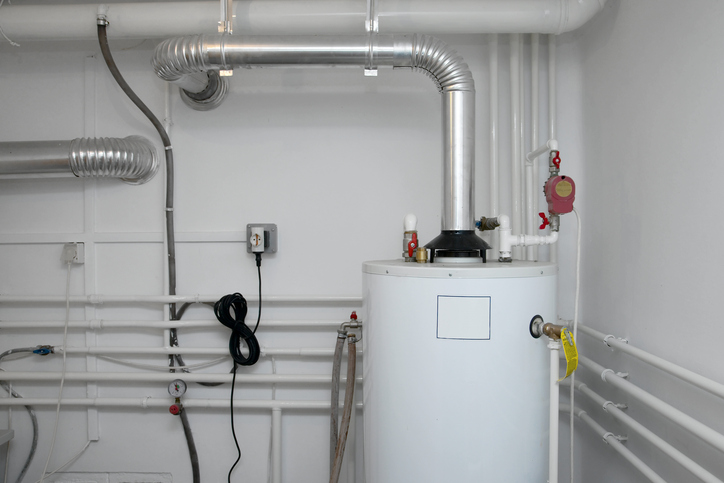
Furnaces
Furnaces create heat, then a blower pushes warm air through your home’s ducts. They run on natural gas, solid fuels, oil, or electricity. Furnace efficiency is shown as AFUE (Annual Fuel Utilization Efficiency) or the percentage of fuel that becomes heat for your home. A higher AFUE is better.
| Furnace Type | Typical Installed Cost | Efficiency (AFUE) | Best For | Notes |
|---|---|---|---|---|
| Gas | $4,500 to $9,000 | 80% to 98% | Most regions with gas service | Fast heat; lower operating cost in many areas. |
| Oil | $4,000 to $8,000 | ~81% to 87% | Rural areas without natural gas | Strong heat output; requires oil tank and deliveries. |
| Electric | $2,500 to $5,500 | 100% at the unit | Mild climates or homes without gas | Lowest upfront cost; higher electric bills in cold regions. |
Who they’re best for: Cold or mixed climates, homes with existing ductwork, and owners who want quick, powerful heat that pairs easily with central air conditioning.
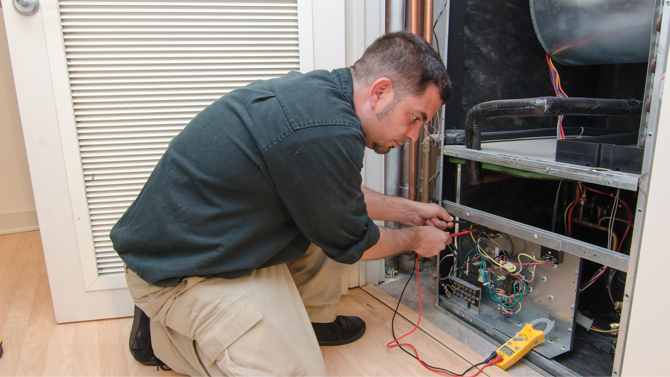
Heat Pumps
While furnaces make heat, heat pumps move it. In winter, they pull heat from outdoor air and bring it inside. During summer, they reverse to cool your home. Heat pump efficiency is shown as HSPF (heating) and SEER2 (cooling). Your contractor can help you choose the right size and model for your climate.
Who they’re best for: Homes that want one system for heat and cooling, owners focused on lower operating costs and steady, efficient heat, and mixed or cold climates using cold-climate or dual-fuel setups.
Boilers and Radiators (Hydronic Heat)
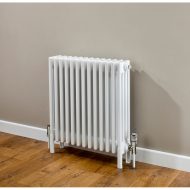 Boilers heat water and send it to radiators or in-floor tubing. The water gives off heat, then returns to the boiler to repeat. This setup delivers even, quiet warmth and keeps dust down because there is no blower.
Boilers heat water and send it to radiators or in-floor tubing. The water gives off heat, then returns to the boiler to repeat. This setup delivers even, quiet warmth and keeps dust down because there is no blower.
Here’s what you should know about boilers:
- Typical Installed Cost: $8,500 to $18,000 for a whole-home replacement, higher for large homes or when adding new radiators or radiant floors.
- Best For: Colder climates, older homes that already have radiators, or anyone who wants gentle, draft-free heat.
- Pros: Very comfortable, quiet, fewer drafts, good zoning options.
- Cons: No cooling (you will still need AC), slower to respond than forced air, higher upfront cost if the home has no existing piping.
Benefits
If you need to choose between a furnace and a heat pump, keep these benefits in mind.
- Furnace: Fast, powerful heat; seamless with central AC; wide range of efficiencies and price points.
- Heat Pump: Heating and cooling in one; lower operating costs in many utility markets; even temperatures and quiet operation.
Common Issues
Wondering what kinds of issues you might see with central heating systems? Here’s what you can expect:
- Furnaces: Dirty filters, failing igniters, cracked heat exchangers, and vent or draft problems. Oil systems may have nozzle, pump, or oil-line issues.
- Heat Pumps: Low airflow from dirty filters or coils, defrost-cycle issues in cold weather, and thermostat or sensor errors. Outdoor units need clear space for airflow.
Full Central Heating Installation Cost
How much you’ll pay depends on system type, home size, duct condition, and installation complexity.
| Heat Pump Type | Installed Cost (Typical) | Best For | Notes |
|---|---|---|---|
| Standard Air-Source (Ducted) | $6,500 to $12,000 | Mild to cold regions with existing ducts | One system for heat and AC; most common choice. |
| Cold-Climate Air-Source (Ducted) | $8,500 to $15,000 | Colder areas that see long freezes | Holds more heating capacity in low temps; quieter, steadier heat. |
| Dual-Fuel (Heat Pump + Gas Furnace) | $9,500 to $16,000 | Places with big temp swings | Heat pump runs on mild days; gas furnace takes over in deep cold. |
| Geothermal (Ground-Source, Ducted) | $18,000 to $35,000 | Long-term homes, high energy savings | Highest upfront cost; lowest operating cost; uses a ground loop. |
What affects cost: New or repaired ducts, electrical upgrades, permits, venting, equipment location, brand, and efficiency level.
Central Heating Repair vs Replacement
Wondering if it’s time to replace or repair your unit? Small fixes can keep a system going, but replacement often makes sense when repairs exceed about 40% of a new unit’s cost, or when the system is 12 to 15 years old and needs frequent service.
Choose replacement when: A furnace has a cracked heat exchanger, a heat pump has a major compressor failure outside warranty, the system is old and inefficient, or you also need extensive duct or code upgrades.
Best Central Heating Unit Brands
The table below shows what you can expect from the top heating brands.
| Brand (Examples) | Typical Unit Cost | Best For |
|---|---|---|
| Trane / American Standard | $2,800 to $6,000 | Reliable performance; wide dealer network. |
| Carrier / Bryant | $2,600 to $5,800 | High-efficiency options; strong comfort controls. |
| Lennox | $2,700 to $6,200 | Top-tier efficiency; quiet operation. |
| Rheem / Ruud | $2,200 to $4,800 | Solid value and availability. |
| Goodman / Amana | $2,000 to $4,500 | Budget-friendly with strong warranties on select lines. |
For more information, dive into our best brand guides for furnaces and heat pumps.
Can I Install My Own Central Heating System?
Short answer: do not DIY a full central heating install. Gas lines, electrical work, refrigerant handling, permits, and safety checks require licensed pros. Professional installation protects your warranty, ensures code compliance, and keeps your family safe. You can help by clearing work areas, confirming power access, and choosing thermostat locations. The rest is professional territory.
How Do I Find a Good Heating Unit Installer?
- Get Three or More Quotes: Ask for itemized bids that list model numbers, efficiency ratings, and all included work.
- Ask About Sizing: Require a Manual J load calculation instead of sizing by square footage.
- Check credentials: License, insurance, permits, and who handles inspections.
- Verify warranty support: Parts and labor coverage, and who files registration.
- Read local reviews: Look for consistent praise for communication, cleanliness, and follow-through.
Next step: We can connect you with pre-vetted local pros for quotes, timelines, and system options. Tap the button below.
Compare top-rated HVAC pros in your area.
Read real homeowner reviews, explore qualifications, and view promotions. Modernize makes it easy to browse professionals and find one that will be perfect for your project.



